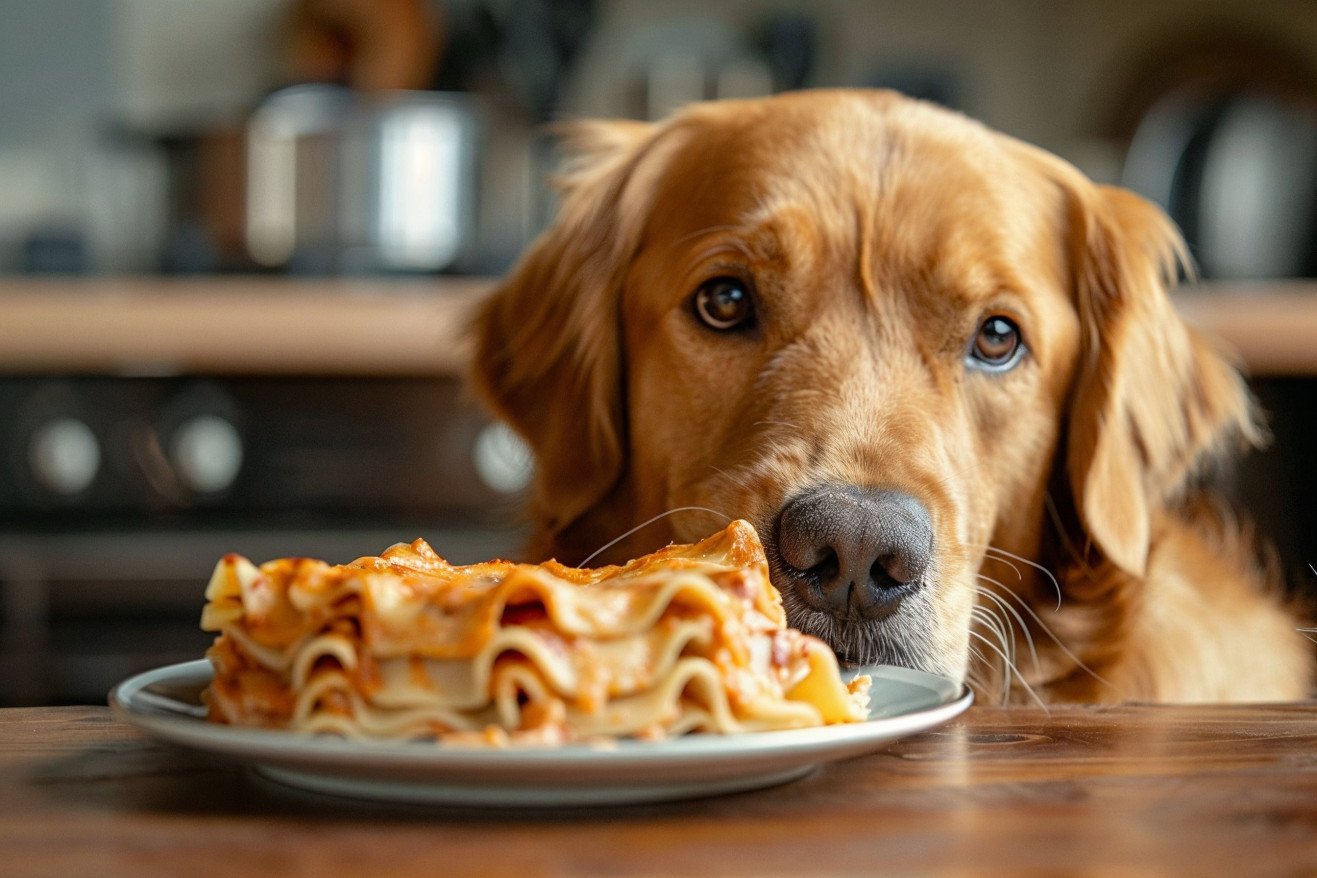Can Dogs Eat Lasagna? A Detailed Guide to the Safety of This Italian Dish
6 June 2024 • Updated 6 June 2024

Lasagna is a delicious Italian dish for people, but can dogs eat lasagna and enjoy its cheesy, pasta goodness? While dogs can technically have small amounts of plain lasagna noodles and certain types of cheese, many of the other ingredients, including onions, garlic, tomato sauce, and seasonings, are not only toxic to dogs but can also cause digestive upset. As a result, it's better to avoid giving dogs lasagna and opt for dog-friendly options.
To make sure we cover this topic in-depth, we referenced veterinary nutritionists, toxicologists, and other pet professionals to find out about each ingredient in lasagna and how it impacts a dog's digestive system and health in general. This information will help you better understand what to look for when choosing safe and healthy treats for your dog.
Can dogs eat lasagna?
Breaking Down Lasagna: Dangerous Ingredients for Dogs
A number of the ingredients commonly found in lasagna are toxic or otherwise dangerous for dogs. According to veterinary toxicologists at CandogsEat.com, onions and garlic have thiosulfate, which can cause oxidative damage to dogs' red blood cells, resulting in hemolytic anemia. Even small amounts can be toxic.
The high-fat dairy products in lasagna, like ricotta and mozzarella cheeses, are also problematic. As PetMD's experts point out, these ingredients can cause pancreatitis, a life-threatening condition, and obesity due to their high calorie content.
While the tomato sauce in lasagna may not seem like a problem, a study by the NIH notes that it often contains a variety of seasonings, preservatives, and other additives that can be harmful to dogs. Even tomatoes themselves are highly acidic and can cause gastrointestinal upset.
Finally, veterinary nutritionists at Tufts University explain that the high salt and fat content in lasagna can put stress on dogs' kidneys and cardiovascular systems. While it may be a favorite for humans, this Italian classic is full of hazards for our four-legged companions.
Are There Any Lasagna Ingredients That Are Safe for Dogs?
While lasagna itself is not safe for dogs, there are some ingredients in lasagna that may be safe for dogs in small amounts. DogTime explains that plain, cooked lasagna noodles are not toxic to dogs, but they don't offer much nutritional value. They also note that low-fat cheeses like cottage cheese and parmesan may be safe to give dogs as an occasional treat because they are lower in lactose than other dairy products.
According to PetMD's veterinary nutritionists, the best protein source in lasagna for dogs is lean, unseasoned ground meat. This will help avoid the potential problems with onions, garlic, and high-fat dairy that are present in the full dish. However, JustFoodForDogs' experts warn that pasta should be given to dogs as an occasional treat and not as a regular part of their diet.
In general, while there are some ingredients in lasagna that may be safe for dogs in small amounts, it's best to avoid feeding them any part of this rich, human food. The potential dangers are not worth the minimal benefits, especially when there are plenty of healthier treat options to choose from.
Health Risks of Giving Lasagna to Dogs
There are many health risks associated with dogs eating lasagna. According to the experts at MiniMe Pet, onions and garlic, which are both common ingredients in lasagna, can cause hemolytic anemia and gastrointestinal upset in dogs. The high fat content of the food can also lead to pancreatitis, which can be fatal.
The dairy in lasagna can also lead to lactose intolerance, which can cause symptoms like vomiting and diarrhea in dogs. As PetMD points out, even dogs who can tolerate small amounts of cheese can have issues with the larger amounts found in lasagna.
The high salt and seasoning content in lasagna can also lead to kidney issues in dogs, which can cause dehydration and electrolyte imbalances. Veterinary nutritionists at Tufts University note that the high salt content is especially problematic for dogs.
With so many potential issues, it’s clear that lasagna is not a safe or healthy option for dogs. While it may be tempting, the risks are not worth any potential rewards. Instead, dog owners should look for healthier alternatives for their pets.
Healthier Dog Treats to Feed Your Dog Instead of Lasagna
While lasagna is a no-go, there are plenty of healthier treats that you can give your dog in moderation. Rover.com suggests that plain, cooked proteins like chicken, turkey, or lean beef can be good healthy treats for dogs. Fresh fruits and vegetables like carrots, sweet potatoes, and apples are also good options.
Wellness Pet Food says that low-fat dairy products like plain yogurt or cottage cheese can be fine as an occasional treat, as long as the dog isn't lactose intolerant. And Petco suggests that homemade dog treats made with dog-safe ingredients are a much better option than human food.
By looking into these healthier treat options, you can give your dog what they want without the potential dangers of feeding them human food like lasagna. You can also talk to your vet to get personalized recommendations for your dog's specific needs and to find out how much of each treat you should be feeding them.
Conclusion: Make Sure You're Prioritizing Your Dog's Health and Safety
Even though lasagna is a delicious treat, it's not worth the potential health risks to feed it to dogs. The risks of digestive upset, pancreatitis, and toxicity far outweigh the benefits. Onions, garlic, high-fat dairy, and excess salt and seasonings found in lasagna can all be harmful to dogs.
Even small amounts of lasagna can lead to vomiting, diarrhea, and anemia in dogs, and certain breeds and dogs with underlying health conditions are at a higher risk. In addition, the high calorie and fat content can lead to obesity and obesity-related health problems in the long run.
Instead of lasagna, dog owners should stick to dog-friendly treats and snacks that will meet their pet's nutritional needs without putting their health in jeopardy. Fresh proteins, fruits, vegetables, and low-fat dairy are all much better options. If you're not sure what to feed your dog, talk to your vet, who can help you come up with a list of treats that are safe for your dog and let you know how much of each treat you can give them.
By making sure you're prioritizing your dog's health and safety, you can make sure that you're giving them treats that are safe and healthy for them while avoiding the potential risks associated with human foods like lasagna. With the right approach, you can make sure that you're giving your dog treats that they'll enjoy without putting their health in jeopardy.


